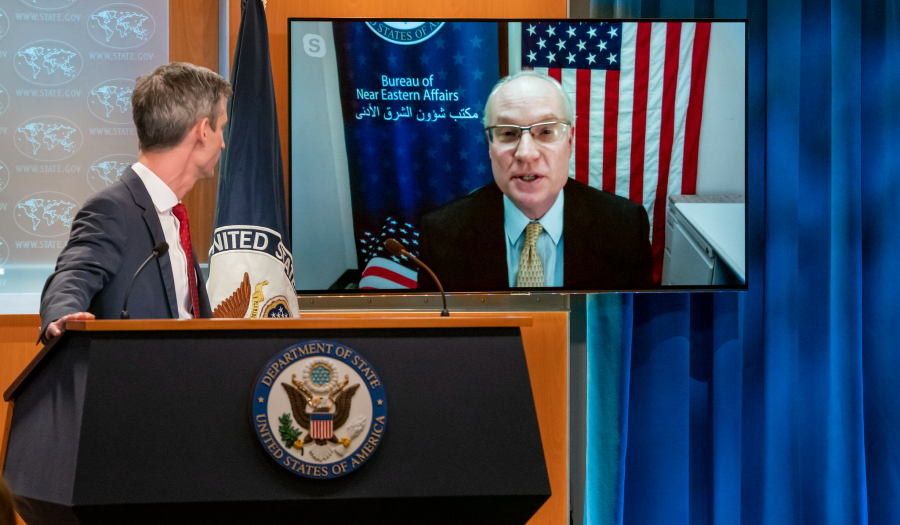Giving Diplomacy a Chance in Yemen
Negotiations are moving again, but an agreement to end the foreign interventions in the country would be just the first step in ending the civil war.

Published by The Lawfare Institute
in Cooperation With

Editor’s Note: One of the knottiest foreign policy problems facing the Biden administration is the civil war in Yemen. Biden vowed a departure from the Trump administration’s uncritical embrace of Saudi Arabia, but how much can the United States move the needle in Yemen? New America’s Alexandra Stark assesses Biden’s Yemen policy, pointing out some successes but also noting how much is left to do before Yemen enjoys a modicum of peace and stability.
Daniel Byman
***
President Biden put U.S. support for the war in Yemen at the center of his first foreign policy speech after entering office, promising in February to step up “our diplomacy to end the war in Yemen—a war which has created a humanitarian and strategic catastrophe” and to end offensive military support for the Saudi-led coalition, “including relevant arms sales.”
While the announcement was greeted as a historic shift in the U.S. approach to Yemen, since then some critics have argued that the administration has been too lenient toward Saudi Arabia in its efforts to negotiate a cease-fire in Yemen, while others say that the United States should take a harsher stance toward the Saudis’ Iran-backed opponent, the Houthis. What can U.S. diplomacy reasonably be expected to achieve?
So far, the administration’s diplomatic efforts have reinvigorated the moribund U.N.-led negotiations and have changed the incentives of many of the key regional players in fruitful ways. But Biden’s Yemen policy has also hit some snags. It confronts a complex situation on the ground that is unlikely to yield quick victories. It has also demonstrated both the promise and the limits of U.S. leverage with security partners. But the investment in slow, painstaking, often-imperfect diplomacy is still worthwhile.
Diplomacy Is Working
Since the February speech, U.S. diplomatic engagement around Yemen’s war has made a few important advances. In March, Saudi Arabia announced a proposal that offered a U.N.-monitored cease-fire in exchange for the reopening of the Sana’a airport and allowing food and fuel imports through Hodeidah port. While the statement wasn’t a significant departure from terms that have been under discussion privately since spring of 2020, the fact that it was offered publicly and essentially endorsed the U.N. initiative was a step forward. The kingdom’s announcement was attributable at least in part to renewed U.S. diplomatic engagement.
There are also positive signs that negotiations between Saudi Arabia and the Houthis are slowly making progress, again linked to engagement from special envoys from both the United States and the United Nations. Oman, a trusted interlocutor, has also taken a more active role in these negotiations. Direct talks between Iran and Saudi Arabia have reportedly focused on Yemen. While Iran does not have command over the Houthis, missiles fired at Saudi Arabia by the group were made with components manufactured by Iran and assembled in Yemen, the U.N. Panel of Experts has concluded, and drones manufactured in Yemen have used Iranian design and components. Though Iran is unlikely to end the partnership entirely, such a deal could ease Saudi concerns about Houthi cross-border drone and missile strikes.
Finally, the appointment of U.S. Special Envoy for Yemen Tim Lenderking has revived the dead-in-the-water U.N.-led process. Increased U.S. diplomatic attention appears to have also catalyzed increased support for the U.N.-led process from other international players and has reinforced Oman’s mediation efforts.
These diplomatic advances are small steps forward, not major breakthroughs. Still, they are all signs that U.S. diplomatic investment has shifted the political calculus of the key players to advance the chances for peace in Yemen.
But Diplomacy Is Painstakingly Slow
At the same time, Biden’s diplomatic strategy is already confronting a complex situation on the ground that leaves diplomats with few easy answers. In February, the Houthis doubled-down on their year-long offensive on Marib, a strategically important area that is the last northern stronghold of forces aligned with the internationally recognized government of Yemen. The Houthi offensive in Marib, where somewhere between 1 and 2 million displaced Yemenis reside, has included “indiscriminately fired artillery and missiles into heavily populated areas … causing mass displacement and exacerbating the humanitarian crisis,” according to Human Rights Watch. Without an immediate cease-fire, the already-dire humanitarian situation in Marib could become much worse.
The Marib offensive is a conundrum for U.S. diplomacy because the United States has little leverage over the Houthis. As long as a battlefield victory could put them in a better position in future negotiations, it will be tough to persuade the Houthis to halt the offensive. At the same time, recent success by pro-government forces in Al Bayda governorate has complicated the question of which side has more battlefield momentum. It is still unclear whether this will change either side’s calculations about the utility of negotiating versus holding out for victory.
Even if the international community is able to negotiate a cease-fire between the Houthis and the Saudi-led coalition, itself a tall order, it will be just one part of ending Yemen’s war. The conflict began as a civil war among Yemeni actors, and the fighting has not resolved fundamental questions about how Yemen will be governed or tensions among stakeholders with conflicting interests and grievances. Fragmentation within armed groups themselves, which has led to infighting among both the Houthis and forces aligned with the internationally recognized government, means that the war is much more complex than the two-sided conflict it is sometimes made out to be.
While the international community should continue to push for an urgently needed immediate cease-fire, the longer-term political process should not be rushed. Pushing through a post-Arab Spring constitutional process and elections without solving the underlying issues failed to prevent this war. Likewise, rushing another peace process without addressing issues of justice and accountability, armed group demobilization, and governance would likely empower the armed groups that have been mobilized by the conflict and leave Yemen’s diverse civil society out in the cold. The international community cannot impose a postwar political order on Yemen—ultimately the fate of Yemen will be up to Yemenis.
For all of these reasons, even successful diplomacy in Yemen will look slow and painstaking.
The Dilemmas of Diplomacy
The Biden administration has been criticized for not taking a tough enough approach to Saudi Arabia. In his speech, Biden noted, “We’re going to continue to support and help Saudi Arabia defend its sovereignty and its territorial integrity and its people.” While the administration promised to end offensive military support for the coalition, the Pentagon clarified that the United States is still providing aircraft maintenance services to the kingdom via foreign military sales. After a review, the administration also announced that it would suspend some offensive weapons sales to Saudi Arabia but advance others to the kingdom and its coalition partner, the United Arab Emirates.
Many advocates of blocking these arms sales have watched with mounting dismay, pointing out that these decisions walk back Biden’s campaign promise to treat Saudi Arabia as an international “pariah.” They’re not wrong, but walking away from the U.S.-Saudi relationship entirely would mean giving up leverage that could be key to ending the Saudi-led intervention in Yemen.
There is a real diplomatic logic at work here. The Biden administration seems to be betting that the United States is best positioned to prod the Saudis toward a face-saving deal in Yemen with a combination of carrots and sticks, and by advocating for Saudi Arabia’s core security interests rather than acting as a dispassionate adjudicator among the parties.
This approach has left Lenderking and the Biden administration open to charges that the United States is failing to act as a “neutral arbiter” in the conflict. The United States, of course, is not a “neutral” mediator. Yet a rich body of scholarly research shows that biased mediators can play conducive roles in negotiations to end civil wars, because they both take actions to ensure that “their” side’s interests are represented in an agreement and can use their unique leverage and knowledge to get their side to negotiate in good faith and make costly concessions.
This approach is unsatisfying to many on different sides, and it is certainly not above criticism. But it should be understood in a context where diplomacy to end civil wars is messy and creates tough dilemmas. It moves in fits and starts, and even when it scores successes behind closed doors, they are often not immediately apparent.
Despite these challenges, the diplomacy necessary to end complex civil wars like Yemen’s is still worth the effort. The United States should resist the temptation to take the easy route of cobbling together a paper agreement between Saudi Arabia and the Houthis and walking away. As Gregory Johnsen argued recently, without a comprehensive peace process, “Yemen could easily slip into a nightmare scenario in which Saudi Arabia strikes a deal with the Houthis, the local civil war is left unaddressed, international attention wanes with the Saudi withdrawal, and the fighting continues on the ground.”
Biden’s investment in diplomacy will have to be sustained over the long run in order to yield real results. And while ending external military intervention is critical, it will be only the first step in the broader challenge of using limited international leverage to help end this devastating and deep-rooted conflict.





